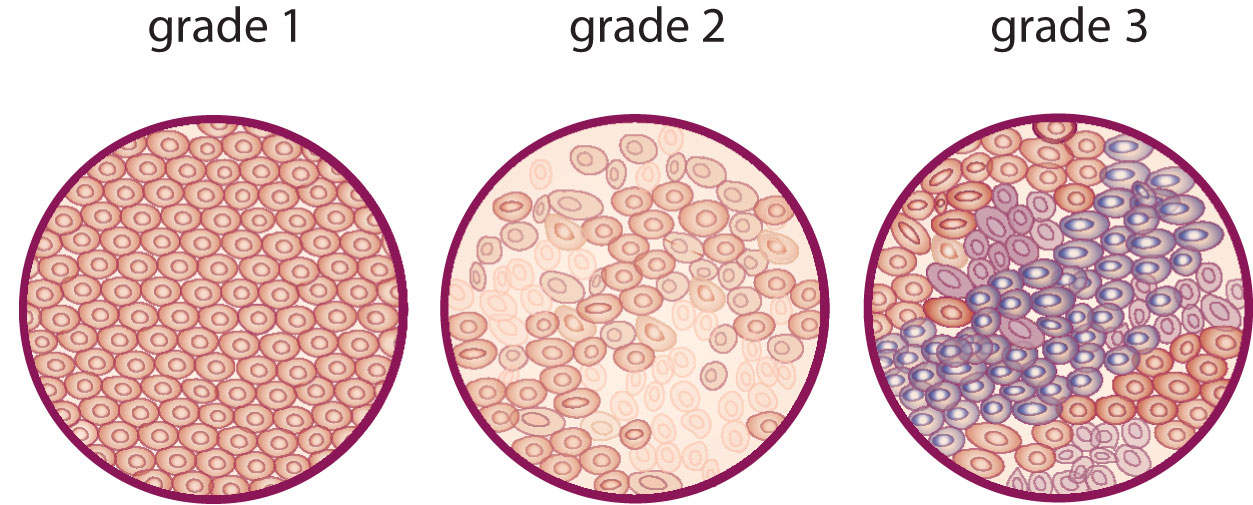Penile cancer
Diagnosis and tests
Diagnosing penile cancer
Your family doctor (GP) will talk to you about your symptoms and examine you. They will refer you to a urologist (specialist) if they think you need more tests. Tests you might have include:
Blood tests – such as a full blood count – can help to check your general health.
Biopsy means taking a sample of tissue. Sometimes a biopsy is necessary to identify if the penile abnormality is a penile cancer. The biopsy can be one of two types:
- An incisional biopsy – the doctor takes a small sample of the affected area.
- An excisional biopsy – the doctor removes the whole of the affected area.
A pathologist will examine the sample under a microscope for cancer cells. It might take over a week for the biopsy results to come back.
Your doctor uses a fine needle and syringe to take a sample of cells (biopsy).
Read more about having a biopsy.
Cancer cells can sometimes spread to the lymph nodes close to the tumour site. Sentinel node biopsy is a test to find out if there are cancer cells in the lymph nodes near your cancer.
Read more about having a sentinel lymph node biopsy.
A PET scan uses a low dose of radioactive sugar to measure the activity in your cells. It is also used to diagnose or determine the stage of a number of different cancers.
Read more about PET scans.
This is a special type of X-ray that gives a detailed, 3D picture of the tissues inside your body. You lie on a table that passes through a large doughnut-shaped machine.
Read more about a CT scans.
MRI uses magnetic energy to build up a picture of the tissues inside your body and can be used to scan any part of your body including your brain, lungs, bowels, penis etc.
Read more about MRI scans.
An ultrasound uses sound waves to build up a picture of your internal tissues, and can be used to scan any part of your body.
Read more about ultrasound scans.

If you are diagnosed with penile cancer, we're here for you.
Our cancer nurses are here if you need information or just want to talk. They can help you to understand your diagnosis and what to expect, send you information and tell you about our services.
Further tests for penile cancer
You may need further tests to give your doctors more information about your general health and about the cancer.
The tests you have can help to:
- Stage your cancer. This means finding out the size and position of the cancer.
- Grade your cancer. Grading describes how quickly the cancer may grow and spread and how it might respond to treatment.
Some tests may be used see how you are responding to treatment.
Waiting for test results
While some results may come back quickly, others may take a few weeks. Waiting for results can be an anxious time. It may help to talk things over with your doctor or nurse or with a relative or close friend. You can also call our Support Line on 1800 200 700 or visit a Daffodil Centre to speak to a cancer nurse.
What are the stages of penile cancer?
Staging means finding out how big the cancer is and if it has spread to other parts of your body. Staging will help your doctor to plan the best treatment for you.
TNM staging system
The staging system normally used in penile cancer is called TNM. This stands for:
- Tumour (T): How deeply the tumour has grown into the penis.
- Node (N): Is there cancer in your lymph nodes?
- Metastasis (M): Has the cancer spread to other parts of your body?
Number staging
Your doctor often uses the TNM information to give your cancer a number stage – from 1 to 4. A higher number means a more advanced cancer. Some stages are further divided into stage A and B.
These early-stage cancer cells are only in the top layers of the skin and look like small lumps or sores.
The cancer has grown into the tissue below the top layers of the skin.
Cancer has grown deep into the tissues of the penis below the top layers of the skin, as well as into the blood and lymph vessels but has not spread to lymph nodes or other parts of the body.
This stage is divided into two:
- Stage 3A means the penis and one or two lymph nodes have been affected and cancer might have grown into the deeper tissues of the penis, urethra or blood vessels.
- Stage 3B means the penis and several groin lymph nodes on one or both sides of the groin have been affected. It might also have grown into the deeper tissues of the penis, urethra or blood vessels – but hasn’t spread to other parts of the body.
The cancer may have spread:
- To nearby body parts (eg prostate gland), and / or tissues / lymph nodes
- To distant body parts (eg lungs, liver or bones) and / or lymph nodes
Knowing the stage and grade of your cancer helps your team to plan the best treatment for you.
What are the grades of penile cancer?
Low-grade cancers usually grow very slowly, while high-grade cancers grow more quickly.

The grade cannot be identified.
The cancer cells look a lot like normal cells.
Some cells look like normal cells but some look abnormal.
The cells look abnormal and do not resemble normal cells.
Staging and grading can be hard to understand, so ask your doctor and nurse for more information if you need it.
Continue reading about penile cancer




Get help & support

Support Line
Free support pack

